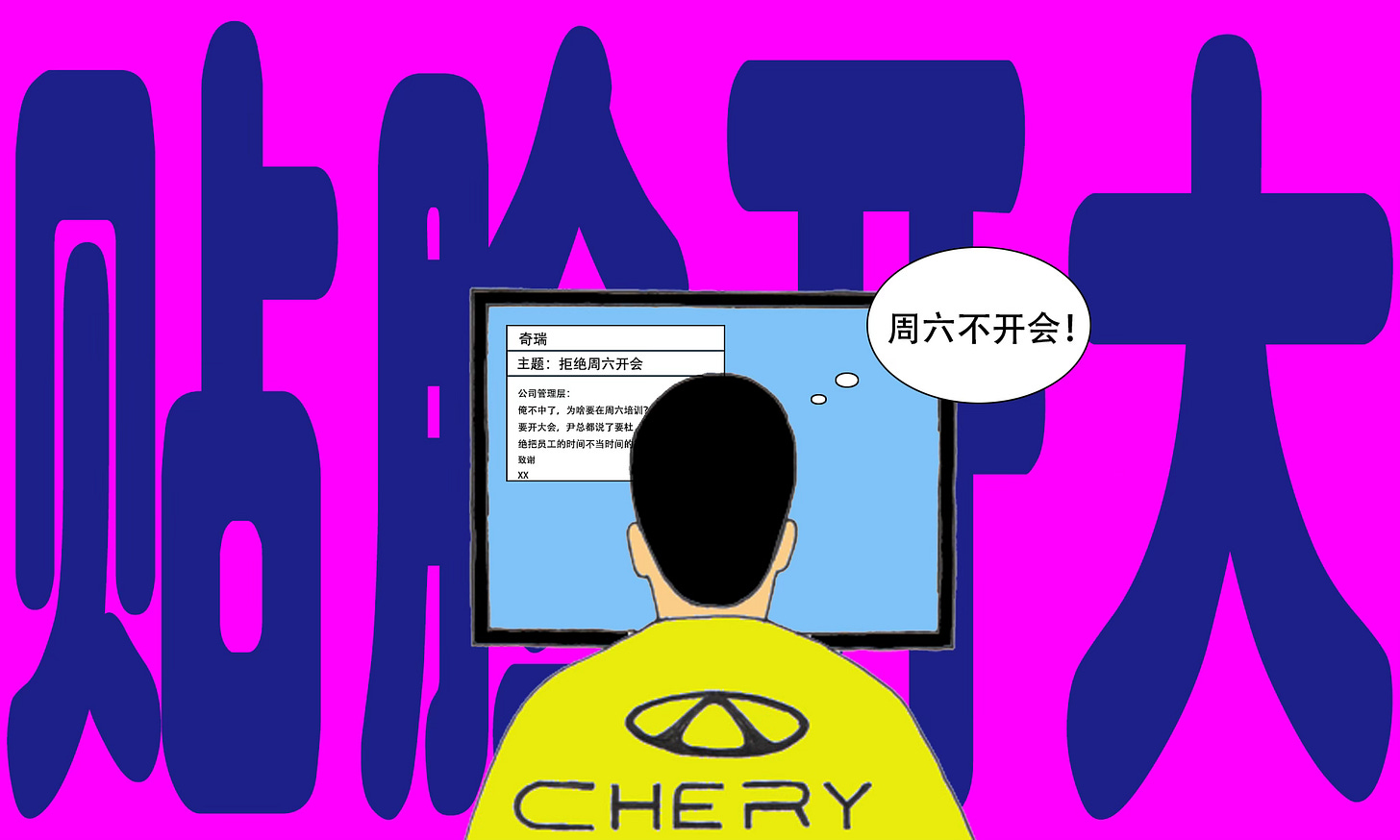"Confront it head-on" — Phrase of the Week
A graduate employee takes on Chery Auto's overtime cutlure

Our phrase of the week is: "confront it head-on" (贴脸开大 tiē liǎn kāi dà)
Context
A graduate employee at Chinese automotive company, Chery (奇瑞), has made headlines after refusing to attend weekend meetings.
When he received an email requiring him to attend training and meetings on Saturday 19 July, he fired back a rejection email—CC-ing the company's top management, including the group's second-in-command.
In his email, he referenced how just two weeks earlier, Chery's chairman, Yin Tongyue (尹同跃), had publicly apologised for the company's "people unfriendly" (非常不人性化) working practices, promising to ban Saturday meetings entirely.
The employee, surnamed Li and known online as "Brother Kai" (凯哥), didn't stop at email. He published his rejection on the company's internal messaging platform, where it received 30,000 likes and thousands of supportive private messages.
The response worked. Chery canceled the Saturday meeting and rescheduled it for Friday.
Many observers noted the irony: it took a young graduate to successfully challenge the company's ingrained overtime culture:
Li, a Gen Z Chery campus recruit, chose to confront it head-on by saying no to the Saturday meeting in an email, in which he copied the company's senior executives, including the group's second-in-command.
一名00后奇瑞校招生李某凯"贴脸开大",在收到公司周六开会的邮件后,直接回复拒绝,并且将邮件抄送公司高层,包括集团二把手。
And with that, we have our Sinica Phrase of the Week.
What it means
The phrase "confront it head-on" directly translates as "face-to-face open big" (贴脸开大).
It originated in gaming, where it means unleashing a player’s most powerful attack at point-blank range for maximum damage and zero mercy. It’s the gaming equivalent of a knockout punch.
Popular in games like League of Legends and Dota, it refers to a character's "ultimate" move (大招), or their most devastating ability. The move involves getting close enough to guarantee a hit and maximise impact. It's a high-risk and high-reward move which needs serious confidence (or recklessness).
Like many gaming terms, it quickly jumped into everyday online language. The phrase evolved to mean "brutally direct", a kind of confrontational honesty for "saying the quiet part out loud".
It carries the same spirit as the original gaming move: direct, devastating, and designed to leave no room for escape or comeback. People use it when calling out hypocrisy or asking questions everyone's thinking but nobody dares ask.
There's often admiration behind the term—a respect for those brave (or foolish) enough to go full confrontation mode.
The Chery overtime incident perfectly demonstrates this: a direct pushback that many employees were thinking but didn't dare voice themselves.
Andrew Methven is the author of RealTime Mandarin, a resource which helps you bridge the gap to real-world fluency in Mandarin. Subscribe for free here.
Read more about how this story is being discussed in the Chinese media in this week’s RealTime Mandarin:
BONUS CONTENT: another 10 popular internet slang terms which began life in gaming:



